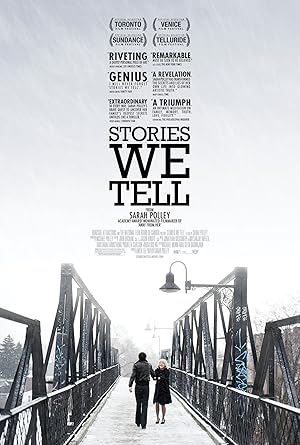
Stories We Tell Page #10
and there was something
of a renewal of the passion
we felt when
we first lived together.
Diane must have been
taken aback, I would guess.
Harry must have proposed
that they live together
at some point,
and she must have been torn
between us,
the old Michael
that she once loved so much.
"Love is so short,
"forgetting so long,"
Neruda wrote.
Harry must have been
very disappointed
when she returned to Toronto,
and I'm sorry for that.
But return to Toronto she did,
and the three of us were happy
to have her with us again.
And then came the discovery
that she was pregnant.
For me, it was joyful.
For her,
it must have been agonizing.
Look, the terrible thing
about all the mental anguish
she underwent
was that she never understood
what my reaction would have been
if she'd told me the whole story.
told her not to worry,
and that I was quite ready
to accept
the ambiguity of the parentage.
But here again, I had failed.
Why is it that we talk and talk,
without somehow conveying
what we're really like?
So what compelled you
initially to want to write
your version of the story?
Well, I was contemplating...
I had been contemplating
for some time...
writing a memoir.
I became persuaded
that this was a strong story,
which could be told
in many different ways,
but which had
a very, very strong structure,
because it skipped
a 30-year period
and skipped a generation.
That it had a particular strength
and a sense of continuity
with respect to memory
and moving forward
from one situation to another.
That it was a story
with great sadness and great joy.
And you suggested at one point
when we met in Toronto
that we each write
our version of it,
and then we would
show it to each other at the end
and might do something with it,
but that was
left pretty open-ended.
So then I subsequently did
write the six-page summary
of the background
with Diane and us meeting.
Harry had written a piece
about his relationship
with you and Diane
and the discovery
that you are father and daughter,
and someone suggested
that he publish it.
You reacted very, very strongly...
very, very strongly to it.
You were enraged,
and you were very upset.
Hi there, Harry.
I suppose I'm confused as to why
it's such a pressing issue for you
that this story be public
when it is already known
by everyone we love
As I said, while my dad
has had some time
to deal with the news,
he has not yet
had to tell his friends
or answer any questions from anyone
outside of his immediate family.
been important for him,
and I believe strongly in protecting that
for as long as possible.
In my case, it goes back
to a somewhat parallel situation
during my relationship with Diane,
which was open to her friends,
but in fact was utterly constrained
by the reality
of her marital situation.
And I found that
at the time oppressive.
I guess I have felt
in this sort of a bit of a...
an echo.
I felt constrained, inhibited,
and sort of pinched
in my relationship to you
because of the private way
in which we were dealing with it.
The atmosphere got
It got heavy because
we were sort of building
misunderstanding
on top of misunderstanding,
and we both proved to be
very capable in that respect.
I was upset that this thing
My taste or desire
to do it at that point
really was no longer there.
"This is not fun anymore.
It's just creating problems. "
So eventually, I dropped it,
and I backed off.
And what was it about having it
published that attracted you?
Well, I think...
I think anyone
who writes anything...
Anyone who does anything
wants to bring it out to the public.
If there's a story to be told,
and if the story has some validity
and some resonance,
then you don't keep it
to yourself.
There was
the honeymoon period,
there was the difficult period,
when I would hear the tones
of voices on the exchanges,
that there was tension.
So this is
in this perfect relationship,
the perfect papa,
the perfect daughter,
everything's perfect,
and it's no longer perfect.
Hi there, Harry.
I'm just extremely uncomfortable
at being involved
in the telling of this story
unless it includes
the whole picture,
which is to say
my experience of it,
your experience of it,
as well as my family's.
I've been thinking a lot
about your desire to tell this story
and my own desire to document
this experience through film.
As I begin this process,
I don't know what form
my project will take.
I don't know
if it's a personal record for myself,
or something
to be made into a piece
for others to see at some point.
I don't know
how long it would take
or if it would ever get finished,
and I wouldn't even pretend at this point
to know how to tell it,
beyond beginning to explore it
through interviews
with everyone involved,
so that everyone's point of view,
no matter how contradictory,
is included.
One day it may turn
into a documentary
for others to consume.
I'm really not sure when
or if I'd want that to happen,
but whatever it ended up being,
it would feel very odd
not to have you be a part of this.
When he considers
this documentary,
being Harry, being a producer,
I'm sure there's a little bit
of trepidation about this film,
because he doesn't have
control of everything.
He understands that.
He doesn't like it.
It's been made clear to him
that this story will be told
from the points of view of everyone
who is alive
who can talk about it,
and my dad
would really like it just to be
about his story of meeting
Diane and being with her
and having you
and meeting you again.
But he's going along with it.
He's trying to be a good sport.
So what do you think of the concept
of me making
this documentary
where we're giving equal weight
to everyone's version of the story?
I don't like it.
into very woolly...
You can't ever
touch bottom with anything then.
We're all over the place.
I think they can all be heard.
which I find...
Particularly those
who are non-players.
First of all, there are
the parties to an incident...
those who were there
and who were directly
affected by it.
Then there is
a circle around that
of people who were
affected tangentially
because of their relationship
to the principal parties.
And then there's another concentric circle
further out there
which basically
has heard or been told
by one of the principal players
about it,
and all of these may have
different narratives,
and these narratives are shaped
in part by their relationship
to the person
who told it to them
and by the events.
One does not get the truth
simply by hearing
People tend to declare themselves
Translation
Translate and read this script in other languages:
Select another language:
- - Select -
- 简体中文 (Chinese - Simplified)
- 繁體中文 (Chinese - Traditional)
- Español (Spanish)
- Esperanto (Esperanto)
- 日本語 (Japanese)
- Português (Portuguese)
- Deutsch (German)
- العربية (Arabic)
- Français (French)
- Русский (Russian)
- ಕನ್ನಡ (Kannada)
- 한국어 (Korean)
- עברית (Hebrew)
- Gaeilge (Irish)
- Українська (Ukrainian)
- اردو (Urdu)
- Magyar (Hungarian)
- मानक हिन्दी (Hindi)
- Indonesia (Indonesian)
- Italiano (Italian)
- தமிழ் (Tamil)
- Türkçe (Turkish)
- తెలుగు (Telugu)
- ภาษาไทย (Thai)
- Tiếng Việt (Vietnamese)
- Čeština (Czech)
- Polski (Polish)
- Bahasa Indonesia (Indonesian)
- Românește (Romanian)
- Nederlands (Dutch)
- Ελληνικά (Greek)
- Latinum (Latin)
- Svenska (Swedish)
- Dansk (Danish)
- Suomi (Finnish)
- فارسی (Persian)
- ייִדיש (Yiddish)
- հայերեն (Armenian)
- Norsk (Norwegian)
- English (English)
Citation
Use the citation below to add this screenplay to your bibliography:
Style:MLAChicagoAPA
"Stories We Tell" Scripts.com. STANDS4 LLC, 2025. Web. 24 Feb. 2025. <https://www.scripts.com/script/stories_we_tell_18926>.







Discuss this script with the community:
Report Comment
We're doing our best to make sure our content is useful, accurate and safe.
If by any chance you spot an inappropriate comment while navigating through our website please use this form to let us know, and we'll take care of it shortly.
Attachment
You need to be logged in to favorite.
Log In